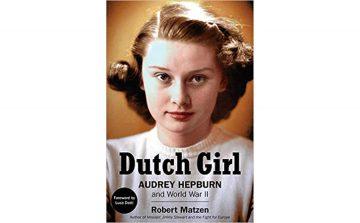Terry Hartle in The Christian Science Monitor:
 Audrey Hepburn was one of the most celebrated actresses of the 20th century and a winner of Academy, Tony, Grammy, and Emmy awards. She was a style icon and, in later life, a tireless humanitarian who worked to improve conditions for children in some of the poorest communities in Africa and Asia as an ambassador for UNICEF. But this extraordinary individual was the product of an extremely difficult childhood. Her father was a British subject and something of a rake and her mother was a minor Dutch noblewoman. Both of her parents flirted with the Nazis in the 1930s. Her mother met Adolf Hitler and wrote favorable articles about him for the British Union of Fascists. After abandoning the family in 1935, her father moved to England and became so active with Oswald Mosley’s fascists that he was interned during World War II. As a child, Hepburn rarely saw him.
Audrey Hepburn was one of the most celebrated actresses of the 20th century and a winner of Academy, Tony, Grammy, and Emmy awards. She was a style icon and, in later life, a tireless humanitarian who worked to improve conditions for children in some of the poorest communities in Africa and Asia as an ambassador for UNICEF. But this extraordinary individual was the product of an extremely difficult childhood. Her father was a British subject and something of a rake and her mother was a minor Dutch noblewoman. Both of her parents flirted with the Nazis in the 1930s. Her mother met Adolf Hitler and wrote favorable articles about him for the British Union of Fascists. After abandoning the family in 1935, her father moved to England and became so active with Oswald Mosley’s fascists that he was interned during World War II. As a child, Hepburn rarely saw him.
Hepburn was shipped off to a small boarding school in England where she fell in love with the world of dance. With the outbreak of the war, her mother brought her back to the Netherlands. There, she became a reluctant observer of the brutal Nazi occupation of Western Europe from 1940 to 1945. Her early life is the subject of Robert Matzen’s latest book, Dutch Girl: Audrey Hepburn and World War II. This is the third book that Matzen has devoted to leading figures of Hollywood’s Golden Age during the war years. As with his earlier volumes, “Mission: Jimmy Stewart and the Fight for Europe” and “Fireball: Carole Lombard and the Mystery of Flight 3,” this book dives deep into a corner of his subject’s life that gets little attention from most biographers. Matzen believes that what Hepburn, Stewart, and Lombard did during the war is interesting in its own right, and that their experiences fundamentally shaped their lives and provide insights into their characters.
More here.
